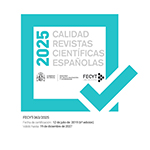The institutionalization of gender equality policies at the Spanish university. Advances and challenges
Abstract
The path to eliminating gender gaps moves between advances and promises. Its pace is determined by the combination of policies, legislation and social changes. Despite the measures taken, gender inequality persists in scientific, technological and academic fields. Equality Plans, which must be implemented at Spanish universities since the adoption of the Organic Law 3/2007 of 22 March for the effective equality of women and men, constitute an important, but not sufficient, step to achieve equality in this area. A key factor can be the structures and networks for the implementation of equality policies (intra- and interuniversity ones, as well as those with other agencies and institutions), which are not sufficiently developed at present. This article describes the process of institutionalization of equality policies at Spanish universities and presents an analysis of the legislation applicable to university level. Furthermore, data about equality units and their characteristics are shown. The article concludes with a reflection upon the elements that can increase the impact of university equality structures as well as the remaining challenges.Downloads
Article download
License
In order to support the global exchange of knowledge, the journal Investigaciones Feministas is allowing unrestricted access to its content as from its publication in this electronic edition, and as such it is an open-access journal. The originals published in this journal are the property of the Complutense University of Madrid and any reproduction thereof in full or in part must cite the source. All content is distributed under a Creative Commons Attribution 4.0 use and distribution licence (CC BY 4.0). This circumstance must be expressly stated in these terms where necessary. You can view the summary and the complete legal text of the licence.











